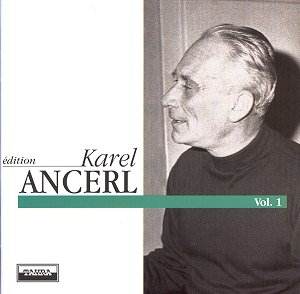Tahra has kept Ancerl’s admirers on their toes for
a number of years now and this 1995 triple CD box was a prestigious
affair. It mined East German radio broadcast material made between 1957-61
principally with the Berlin Radio Symphony Orchestra (though the Prokofiev
was made with the Leipzig Gewandhaus).
The central panel of the
set, disc number two, is entirely given over to familiar Ancerl territory,
Dvořák, and yet not quite so. Recorded over three days in June
1960 we have both sets of Slavonic Dances, opp 46 and 72 – the
more famous of which, op 46, can be judged against Ancerl’s commercial
Supraphon recording and the less comprehensively known, op 72 – which
Ancerl never recorded commercially – can most easily be contrasted with
the live concert in Wellington the previous year given by the triumphant
Czech Philharmonic during their Australasian tour, a performance also
issued by Tahra. In truth neither traversal here, though there are numerous
affectionate felicities, quite measures up to the competition. I liked
the Berlin orchestra’s romantic wind playing and the many points of
overlapping string lines, the bounce and vigour, the frequent sharply
accented paragraphs, the fresh air approach; The third of the op 46
set has delicious wind playing and the violin pointing in the fourth
is splendid; but the strings are not flattered by the studio acoustic
and there is a lack of opulence that, whilst good for clarification
of sectional writing, is less good for weight of romantic impress and
the unforced geniality the music needs. In the Op 72 set the magical
ebullience of the Wellington performance can’t be replicated in the
studio; that evening was punctuated by delighted applause and whilst
Ancerl and the Berlin orchestra are committed and strongly athletic
and bring gusto to the scores, once more a frisson is missing.
The set actually opens with a pairing of Haydn and
Schubert from two concerts in 1957 and prime candidates for Tahra’s
retrievals since these are not composers at least much known commercially
from the Ancerl discography. I like the strong, sinewy first movement
of his Haydn, the unvarnished phrasing of the slow movement with its
nice swells and diminuendos. He’s no prude when it comes to the bassoon
joke either. He takes the minuet at a good brisk lick and despite a
few seconds of rather strange distortion at the beginning of the finale
he offers an enjoyable and frequently vivacious reading without distortions
or point making. It’s not a revelatory reading but it’s hardly a negligible
one either. Equally satisfying is the Schubert – good piping woodwinds
in the opening movement, a sense of genuine symphonic momentum realized,
alert rhythms and lean cello sonority. The Andante is realized as the
tempo indicates con moto – this is no congealing Andante-as-Largo
– and is it my ears hearing what they want to hear or does Ancerl manage
to elicit just a smidgen of Bohemian folk vigour here? There is something
almost Mahlerian in Ancerl’s hands about the oppositional character
of the Scherzo … and the finale goes nicely indeed. There were two performances
of the symphony given on consecutive nights in December 1957 but as
to which was used in this performance Tahra is silent.
The final disc is given over to the Russian repertoire
of which Ancerl was so adept and idiomatic an interpreter. Two heavyweight
works are given, Scheherazade and Romeo and Juliet (premiered, it’s
often forgotten, in Brno in 1938). The former was once more given on
two nights in January 1957, the latter from a single concert four years
later. The leader of the Berlin orchestra has an opportunity to shine.
With his quick portamenti and control of dynamics he acquits himself
well. The brass is solid; strings are clean limbed and clear, not opulent.
I enjoyed Ancerl’s big spaced drama in the second movement – though
he’s never going to approach Kletzki’s well calibrated strength here
- and the playful expressivity he imparts to the Young Prince and Princess.
At various points the balance seems slightly awry – particularly in
the final movement – but it’s of barely any account. I don’t have Ancerl’s
commercially issued Romeo and Juliet but Tahra’s notes aver that in
their November 1961 performance in Leipzig he adds three scenes here
that were omitted in the Supraphon disc. There’s plenty of bite and
romance here and the Gewandhaus Orchestra dig in with vigour but with
their characteristic refinement as well.
Notes are in French and Italian only, with some splendid
vintage photographs as well. For once the relatively familiar shot of
Ancerl looking happily absurd in a kimono is eclipsed by one of him
with Alois Haba posed by what looks like one of Haba’s scary looking
quarter-tone keyboards. As for the music – strongly recommended.
Jonathan Woolf


